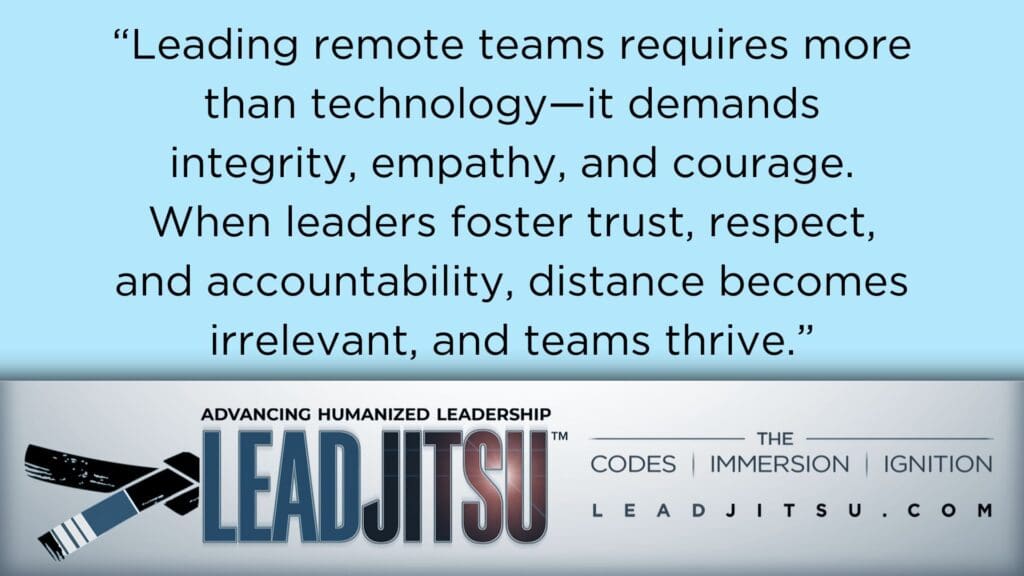Remote teams have become a staple in modern business, but leading them effectively requires more than just technology—it requires strong leadership grounded in trust, empathy, and discipline. Traditional methods often fall short when physical presence is removed, leaving teams feeling disconnected, less engaged, and uncertain about their value within the organization.
Enter LEADJITSU, a leadership system built on principles of martial arts that emphasize integrity, empathy, adaptability, and disciplined leadership practices. LEADJITSU provides a roadmap for creating high-performing, engaged remote teams by addressing key challenges: trust, accountability, and inclusion.
The Challenges of Leading Remote Teams
Managing remote teams presents a unique set of challenges. Without daily in-person interaction, many leaders struggle to ensure their team members feel connected and valued. Remote workers often report feeling isolated, overlooked, or disengaged. According to studies, remote employees are 42% more likely to feel left out of important decisions, and 30% of remote workers cite lack of visibility as a barrier to career advancement. Leaders must overcome these hurdles to ensure their teams remain productive and motivated.
In addition, trust and accountability become more difficult to manage when employees are not in the same physical space. Leaders may fall into the trap of micromanaging, which erodes trust, or may fail to set clear expectations, resulting in missed deadlines and reduced productivity.
Enter the Generational Leadership Dojo
In today’s workforce, success isn’t just about managing teams—it’s about creating harmony across generations. The LEADJITSU Multi-Generational Leadership Workshop is a powerful, interactive experience designed to bridge the gap between Baby Boomers, Gen X, Millennials, and Gen Z. This 2.5-hour workshop equips leaders with the tools to foster respect, inclusion, and clear communication across generations.
Through practical exercises and the LEADJITSU Leader’s Code, your team will learn how to leverage generational diversity for innovation, collaboration, and sustained success. It’s time to move beyond generational divides and unite your team with a shared vision.
Empower your team to thrive together. Let’s build a future where every generation contributes to creating a dynamic and inclusive workplace.
Schedule a complimentary consultation today.
LEADJITSU as the Solution for Remote Leadership
LEADJITSU offers a framework that helps leaders develop the skills needed to address these challenges head-on. By focusing on principles like Gi Integrity, Dojo Respect, and Warrior’s Courage, leaders can foster a sense of trust, accountability, and connection in their remote teams. Here’s how:
Gi Integrity: Build Trust Through Consistency and Transparency Remote teams thrive on trust, and leaders must create a culture where employees feel confident that they are supported, valued, and heard. Gi Integrity, a core LEADJITSU principle, teaches leaders to act with honesty and consistency. In remote environments, this means setting clear expectations, providing regular feedback, and following through on promises.
Leaders should establish regular communication channels, such as weekly check-ins or virtual open-door policies, to ensure team members feel connected. Transparency about goals, expectations, and challenges builds trust, while demonstrating integrity helps remote workers feel secure and valued.
Dojo Respect: Foster Inclusion and Collaboration Remote work can make employees feel disconnected from the team, leading to decreased collaboration and a sense of isolation. Dojo Respect emphasizes the importance of creating an inclusive environment where all voices are heard. Leaders can foster inclusion by ensuring remote employees are actively involved in meetings, decisions, and team discussions.
LEADJITSU teaches that every member of the “dojo” (workplace) deserves respect, regardless of their location. Encourage open dialogue and ensure that remote employees feel their input is just as valued as those in the office. Tools like virtual roundtables, collaborative platforms, and project management systems help ensure everyone stays connected and informed.
Warrior’s Courage: Balance Accountability and Empathy Holding remote employees accountable can be challenging, but micromanaging is not the solution. Leaders must have the courage to trust their teams while maintaining clear accountability structures. Warrior’s Courage in LEADJITSU teaches leaders to address issues directly, without hesitation, while maintaining empathy and understanding.
Leaders should set clear performance metrics and regularly review progress with their teams. If an employee is struggling, it’s important to have the courage to address it early with empathy. Rather than jumping to conclusions or assigning blame, use feedback as an opportunity to understand the root cause of the issue and work together on solutions. Accountability and empathy go hand in hand when building a thriving remote team.

Building Connection Through Empathy and Inclusion
In addition to formal practices, emotional intelligence plays a vital role in leading remote teams. LEADJITSU emphasizes the importance of Empathetic Connection—the ability to understand and resonate with your team’s emotions. Leaders must create a space where remote employees feel comfortable discussing their challenges, whether they are work-related or personal.
By taking the time to understand the unique struggles remote workers face—like balancing work-life integration or feeling isolated—leaders can provide tailored support and show genuine care for their employees’ well-being. This empathy fosters deeper connections and enhances overall team morale.
LEADJITSU’s Comprehensive Approach to Remote Leadership
LEADJITSU’s principles offer a practical and human-centered approach to leading remote teams. By fostering trust through Gi Integrity, promoting inclusion with Dojo Respect, and balancing accountability and empathy with Warrior’s Courage, leaders can create a culture of connection and productivity, even from afar.
Remote teams don’t have to feel disconnected or disengaged. With the right leadership approach, they can thrive and contribute meaningfully to the organization’s goals.
Contact us to learn how LEADJITSU can help you unlock your team’s full potential. Interested in bringing LEADJITSU principles to your remote team?



